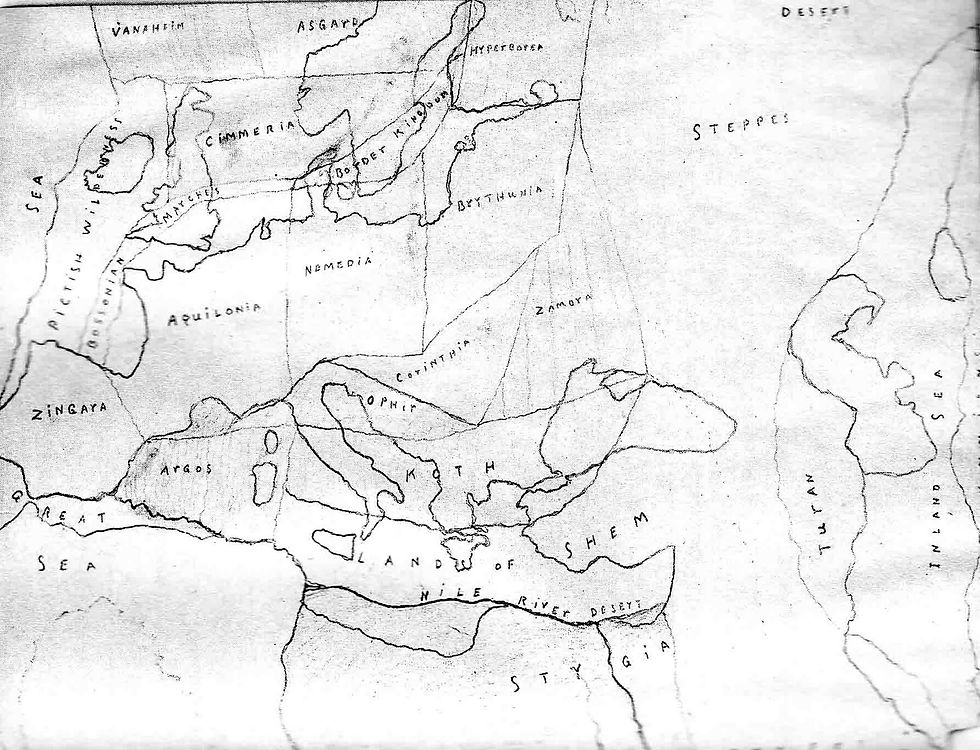All Fantasy is Cultural Appropriation. In the Best Possible Way.
- Jul 20, 2017
- 4 min read

NOTE: This post appeared earlier this year on Leona's Blog of Shadows and I'm reposting it here because I like all my stuff in one place.
Cultural appropriation is seldom said with a positive connotation, and for good reason. Because nothing is more offensive than seeing suburban kids dolled up in hip-hop attire, or idiots donning red wigs and drinking themselves to oblivion because it’s Saint Paddy’s Day.
I think we can all agree that for both those examples punishment is in order. Preferably corporal and with extreme prejudice. You know, because of their extreme prejudice.
But in the case of the fantasy genre, cultural appropriation is necessary; a cultural and historical shorthand aimed at the audience that actually forms our sub-genres. And, unlike the examples above, in fantasy the cultural appropriation shows appreciation for the chosen culture because fantasy authors add a little something extra to it to make it their own.
Because, like it or not, all fantasy authors are actively appropriating, even if they’re not aware of it. Mainly because, with perhaps the exception of Urban Fantasy, authors simply do not live in the time period or culture we use as the basis to build our worlds upon. Yet we take cultures and histories and reshape them in our own graven images, and it’s from this appropriation that the fantasy genre as a whole is defined.
Don’t believe me? Well consider what the average reader thinks of when they hear a story belongs in the fantasy genre. Nine times out of ten they’ll envision a vaguely medieval setting with a large dose of European cultural parallels: Stories of castles and knights, swords clashing against armor with loads of milords, thees and a smattering of thous. To the vast majority of readers, fantasy as a genre is decidedly Euro-centric with maybe an elf or dragon thrown in.

Subtlety was not exactly Howard’s strong suit in his European cultural appropriation.
And for the most part, they’re correct, as the sub-genres of High Fantasy, Epic, Heroic, and Sword and Sorcery all reflect a medieval flavor with strong overtones of Europe; because the seminal works in these subgenres were largely written by Europeans drawing from their own culture and history for inspiration. They chose European settings and medieval time periods because that was what they knew, and over time those cultural and historic anchors became cornerstones of the sub-genres.
In short, sub-genres are defined by which culture and history is being appropriated by the author, examples including Gunpowder Fantasy, Gaslight Fantasy, Arabian, Wuxia, Steampunk, Prehistoric, Mythic, Arthurian, Portal and Fairy Tales. As soon as a potential reader sees what sub-genre the book belongs in, s/he instantly know what to expect in terms of cultural and historic parallels within the story. Because the cultural and historic appropriation works as a shorthand for both author and audience to find each other and share their similar interests.
The other aspect in fantasy that keeps our cultural appropriation from being the decidedly bad kind comes down to each author inserting their own fantasy conceit into the appropriated culture and history. It’s this introduction of the unnatural that makes it fantasy rather than alternative history.
Some authors wear their fantasy conceit, as well as their cultural/ historical influences, on their sleeves, such as Pride and Prejudice and Zombies, or Abraham Lincoln, Vampire Hunter. Others, like Lord of the Rings, are subtler with their medieval England reinterpreted with the introduction of elves, dwarves, and wizards. Game of Thrones keeps the same basic English cultural cornerstone, but then adds other real-world cultural parallels with the definitely Mediterranean influenced Dorn or Bravos. And still others, like Avatar: The Last Airbender, eschew Europe altogether and draw heavily from Eastern influences.

I'm reusing this image because I need to break up all the text here and it's already uploaded to my site.
Audiences expect a certain cultural and historic parallel to anchor their experience to this new world fantasy authors are tossing them into, so authors should use this expectation to their advantage. For my Gunpowder Fantasy novel The Woven Ring, I leaned into my appropriation with my first words from the blurb: “A fantasy re-imagining of the American Civil War…” This was a conscious decision on my part to orient any potential readers to the expected culture (American), historical (1900s), and thematic parallels (Civil War) from the onset and let them know what they can expect when they enter my world.
The famous quote is “those who cannot remember the past are condemned to repeat it,” but the lesson I take from it (“appropriated,” if you will) is “those who do not know their history are doomed to write bad fantasy.” Because, consciously or not, fantasy audiences crave a sense of authenticity in regards to the appropriated culture/ time period. So it pays to not only be consciously aware of what time period you are appropriating as an author, but to research it extensively so as to give your audience that sense of authenticity. Little details like the style of dress or food at the time go a long way in creating this and are appreciated by the audience, even if they’re not consciously aware of it.
That said, your personal fantasy conceit you’re interpreting your appropriated culture through should not be ignored either. So while it’s nice to know specifically what style of armor your knights would wear to be historically accurate, the story should never suffer from being beholden to the details.
I mean, this is fantasy after all.

























Comments